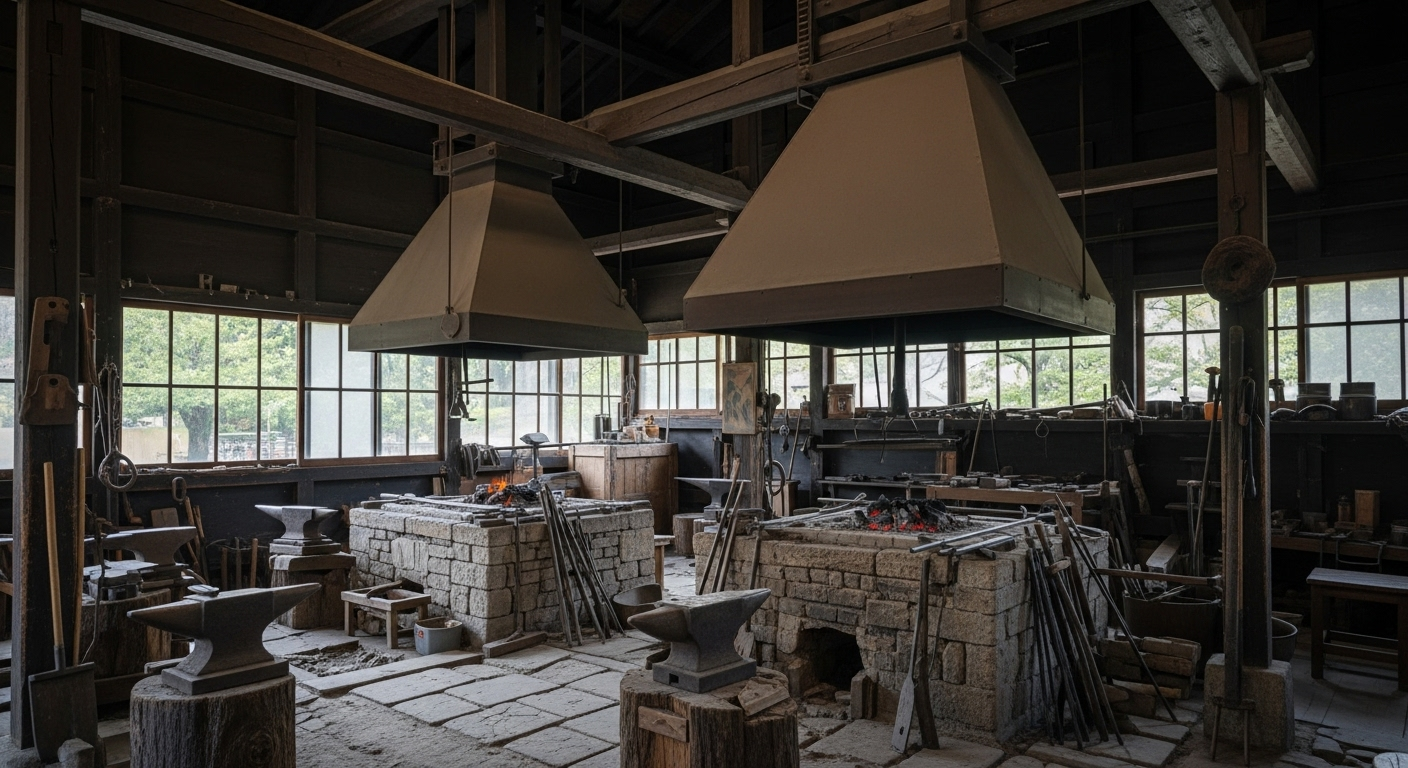
Sakai’s Traditional Craftsmen — Preserving the Soul of Japanese Knife-Making
-
-
Guardians of the Blade — The Traditional Craftsmen of Sakai
In Sakai, Japan, a handful of master artisans carry the weight of over 600 years of knife-making tradition. Recognized by the Japanese government as Traditional Craftsmen, they dedicate their lives to preserving time-honored techniques while embracing innovation for the future. This is the story of their skill, spirit, and the community that keeps this cultural treasure alive.
What Is a Traditional Craftsman? — The Highest Level of Skill Recognized by the Nation
-

In Japan, certain crafts have been passed down for centuries and are known as “Traditional Crafts.” The people who sustain these traditions are more than just artisans — they are “Traditional Craftsmen,” officially certified by the Japanese government for their exceptional skills. In Sakai City, a town renowned for its kitchen knives, only a select few artisans earn this prestigious title.
To be certified as a traditional craftsman, one must meet extremely high standards:
-
- Over 12 Years of Hands-On Experience
Craftsmen are required to devote more than 12 years to mastering the intricate techniques involved in producing government-designated traditional crafts. - Rigorous skill testing
They must pass both written and practical exams to objectively prove their craftsmanship. - A deep connection to local tradition
In most cases, the craftsmen must live and work in the region where the craft is rooted, ensuring that their skills are shaped by local culture and history.
- Over 12 Years of Hands-On Experience
-
-

Only 28 Craftsmen — Rare Keepers of a National Treasure
As of May 2024, only 28 traditional craftsmen in Sakai specialize in Japanese knives. This number speaks volumes about how rare and invaluable their expertise is. These artisans are the invisible foundation behind the global reputation of Sakai's knives.
-
The Path to Mastery — More Than 10 Years of Relentless Training
Becoming a traditional craftsman is not a job — it is a lifelong commitment to mastery.
-

- Over 12 Years of Rigorous Apprenticeship
Their journey begins with the most fundamental techniques and evolves through years of trial, error, and relentless practice—a path that demands at least 12 years of unwavering dedication. - Exceptionally difficult certification exams
Both technical knowledge and practical ability are tested. The pass rate is very low. - Lifelong refinement
Even after certification, craftsmen must continually evolve and polish their skills. Complacency has no place in this world.
- Over 12 Years of Rigorous Apprenticeship
-
More Than Craftsmen — They Are Guardians and Innovators
Traditional craftsmen are not simply preserving the past — they are bridging tradition and innovation. Their roles are vital:
- Passing down techniques
They mentor younger artisans and ensure that ancient skills live on. - Maintaining quality
Their uncompromising standards are what make Sakai knives trusted by chefs worldwide. - Driving innovation
They embrace new materials and ideas while honoring time-honored methods.
- Passing down techniques
-

Challenges for the Future — What Must Be Protected
Despite their importance, traditional craftsmen in Sakai face serious challenges:
- A declining number of successors
Fewer young people are choosing this demanding path, putting the transmission of skills at risk. - Shifting global markets
Rising international competition demands that craftsmen maintain quality while staying sustainable. - Need for better education systems
Skills once passed through intuition and observation must now be preserved through formal training programs.
- A declining number of successors
-

In the End, What We’re Protecting Isn’t Just Tools — It’s Spirit
The knives made by Sakai’s traditional craftsmen are far more than culinary tools. They are reflections of respect for food, care for detail, and the spirit of craftsmanship.
To honor that spirit, we must recognize, support, and share these values with future generations.
Thanks to these artisans, the knives of Sakai continue to earn the love and trust of chefs around the globe. If we want these treasures to survive another hundred years, it is our turn to protect the hands that make them.

The Soul of Craftsmanship
-
600 Years in Every Blade
Sakai’s Japanese knives are more than tools—they are masterpieces shaped by centuries of tradition. Each blade carries the wisdom, skill, and dedication of countless generations.
-
When you hold a Sakai knife, you don’t just feel sharpness or balance—you feel the history and spirit etched into every cut. This is what makes Sakai’s knives truly exceptional, and why we artisans are committed to carrying this legacy forward.

Experience the sharpness trusted by 98% of Japan’s top chefs — handcrafted in Sakai City.
Through our exclusive partnership with Shiroyama Knife Workshop, we deliver exceptional Sakai knives worldwide. Each knife comes with free Honbazuke sharpening and a hand-crafted magnolia saya, with optional after-sales services for lasting confidence.
KIREAJI's Three Promises to You
-

1. Forged in the Legacy of Sakai
From Sakai City—Japan’s renowned birthplace of professional kitchen knives—each blade is crafted by master artisans with over six centuries of tradition. Perfectly balanced, enduringly sharp, and exquisitely finished, every cut carries the soul of true craftsmanship.
-

2. Thoughtful Care for Everyday Use
Every knife includes a hand-fitted magnolia saya for safe storage. Upon request, we offer a complimentary Honbazuke final hand sharpening—giving you a precise, ready-to-use edge from day one.
-

3. A Partnership for a Lifetime
A KIREAJI knife is more than a tool—it is a lifelong companion. With our bespoke paid aftercare services, we preserve its edge and beauty, ensuring it remains as precise and dependable as the day it first met your hand.








